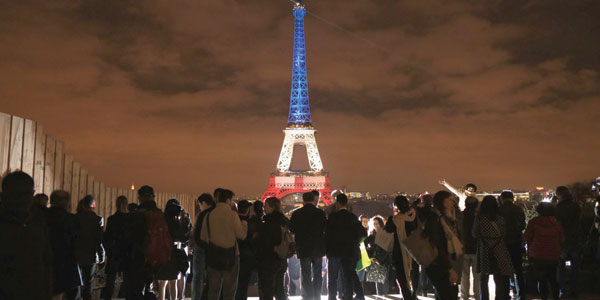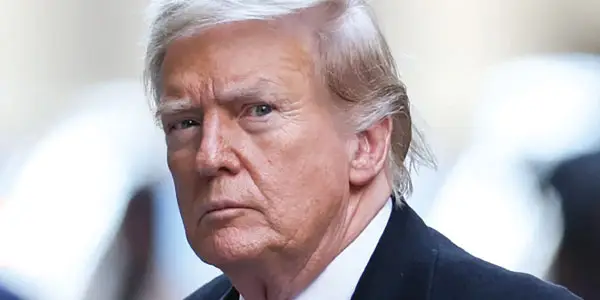PARÍS — Nadie espera morirse en París -una de las ciudades más bellas y civilizadas del mundo — de un bombazo, de un balazo o de un ataque terrorista. Eso, generalmente, pasa en otros lugares. No aquí. Por eso estos últimos días han sido tan extraños.
Llegué horas después de que terroristas de grupo Estado Islámico en Irak y Siria (ISIS) causaran la muerte a más de 120 personas en restaurantes, bares, un teatro y un estadio de futbol. Parte de ser periodista es llegar — y rápido — a los sitios de donde la gente sale huyendo. Y nunca había visto a París tan vacía, tan triste y tan asustada. Hasta la torre Eiffel estaba cerrada y sin luces.
En Londres, un día después de los ataques terroristas al metro y autobuses en el verano del 2005, los británicos salieron a retomar sus calles. Yo los vi. No, no iban a dejar que los terroristas de Al Qaeda les robaran sus libertades y su estilo de vida.
En cambio muchos parisinos se quedaron en casa días después de los ataques terroristas (tal y como lo había solicitado su presidente François Hollande). El miedo se podía tocar. Nadie creía que solo siete, ocho o nueve militantes de ISIS podían haber causado semejante masacre. Otro ataque podía ocurrir en cualquier momento.
ISIS logró lo impensable: llevar la guerra hasta París. La lógica de los terroristas es muy primitiva y directa: Francia bombardeó civiles en Siria y ahora ellos, en represalia, fueron a matar civiles en Francia. Y Washington sigue, amenazaron.
Leticia, Cristal, Ani y Vincent llegaron con miedo a la entrevista que tenían conmigo frente al teatro Bataclan, donde habían muerto 89 personas. En el metro se fijaban en las personas que llevaban mochilas. Temían otro atentado.
Ellos cuatro — ninguno pasa de los 23 años de edad — son sobrevivientes de los atentados de París. Estaban en el partido de futbol que Francia le ganó 2 a 0 a Alemania cuando oyeron unos estallidos. Más tarde se enterarían que, a las afueras del estadio, tres terroristas suicidas detonaron las bombas caseras que llevaban escondidas debajo de la ropa.
Esas bombas eran para ellos, y no entienden por qué otros jóvenes los querían matar. No se los quise decir pero creo que la guerra apenas comienza y va a durar muchos años.
Estos momentos en París me recordaron tanto las horas posteriores a los actos terroristas del 11 de septiembre del 2001 en Nueva York. El miedo crudo, la incertidumbre, la impotencia. No, no queríamos perder nuestras libertades y derechos pero, antes, había que salvar la vida.
Sin embargo, las costumbres de los hombres y mujeres libres de Francia se imponen y, poco a poco, retoman los espacios públicos. Los cafés en los Campos Elíseos, en Le Marais y en Saint Germain des Prés se han vuelto a llenar. Hay fila, otra vez, para comer bistec con salsa de pimienta y papas fritas en el restaurante Entrecote. Cada tasa de café, cada copa de vino de burdeos y cada paso dado en la calle es una minúscula pero significativa victoria frente a los intolerantes.
Pero la guerra sigue. La tele está llena de sabelotodo que, equivocadamente, comparan a refugiados con terroristas y a musulmanes con violentos. Cambio de canal, veo la magnífica cobertura de CNN, y sé que al llegar a casa en Estados Unidos me esperan los mismos gritos con los que, injustamente, comparan a inmigrantes con criminales y terroristas. Sé también que la próxima elección en Estados Unidos es de increíble importancia: ese presidente o presidenta nos podría llevar a una guerra — otra más — en Siria.
Antes de irme de París paso por la torre Eiffel — que ahora está pintada de azul, blanco y rojo — y me detengo de nuevo frente al teatro Bataclan. Al lado están las ofrendas a los muertos: las flores, las velas, las cartas con cosas que nunca se dijeron en vida. “Esta es la generación Bataclan,” le oigo decir con razón a un reportero español. Sí, a esta nueva generación le toca resolver un problema — el del extremismo suicida — que hoy parece intratable. Hoy los políticos en el poder, tanto en Europa como en Estados Unidos, no saben qué hacer.
Mientras, la lluvia gélida del noviembre parisino — como el miedo mismo — se cuela incómodamente por mi chaqueta, desde el cuello hasta la espalda, y no sé si tengo más frío por dentro que por fuera.
(Jorge Ramos, periodista ganador del Emmy, es el principal director de noticias de Univision Network. Ramos, nacido en Mexico, es autor de nueve libros de grandes ventas, el más reciente de los cuales es “A Country for All: An Immigrant Manifesto.”)
(¿Tiene algun comentario o pregunta para Jorge Ramos? Envie un correo electrónico a Jorge.Ramos@nytimes.com. Por favor incluya su nombre, ciudad y país.)
__________________________________________________________________________________________________________
War Comes to Paris
By Jorge Ramos
PARIS — This city, one of the most beautiful and civilized in the world, is not the place you’d expect gunmen to stand outside a café and spray diners with bullets. Nor the place you’d expect suicide bombers to strap explosives to their bodies and detonate them at a stadium. Nor the place you’d expect extremists to enter a crowded theater and randomly gun down concertgoers. Those sorts of attacks usually happen elsewhere.
Indeed, until the evening of Nov. 13, terrorism of that scale was unheard of in Paris (although the attacks earlier this year, at Charlie Hebdo and in the kosher supermarket, are seared in memory). Now, worrying about more attacks is part of day-to-day life.
I arrived in Paris just hours after militants from the so-called Islamic State killed more than 120 people in coordinated attacks on restaurants, bars, a theater and a soccer stadium in the city. This is the role of many journalists — to head toward the places people are running away from. When I arrived, the city was empty, sad and scared. Even the Eiffel Tower was dark. I had never seen Paris in such a state.
With their brutality, the militants from ISIS managed to do the unthinkable: They brought the war to Paris, justifying their acts with a primitive, twisted logic. France has been dropping bombs on Syria in recent months, so they retaliated by killing civilians in France. The U.S. is next, they declared in a video and on social media.
Following the advice of French President François Hollande, many Parisians stayed home and hunkered down for some days after the attacks. As a hunt for the terrorists ensued, people wondered if more attacks were imminent. Their fear was palpable. Nobody believed that just seven, eight, nine militants could commit such a massacre. And, as far as Parisians knew, another bomb could go off at any moment.
Just a few days after the attacks, I sat down to talk with four students — Leticia, Cristal, Ani and Vincent, none of them older than 23 — in front of the Bataclan Theater, where 89 people attending a concert were gunned down. On Nov. 13, the four students attended a France vs. Germany soccer match during which they heard explosions. They would learn later that outside the stadium, three suicide bombers had detonated homemade bombs hidden under their clothes.
Understandably, these four youngsters remain fearful of another attack. They keep a watchful eye on people with backpacks on the subway. They are constantly alert. They realize that the terrorists’ bombs were meant for people like them — young Parisians. And they can’t fathom why the militants, some of whom were also in their 20s, would want to target them. While we spoke, it occurred to me that this particular war is just beginning, and it will likely go on for many years. I did not mention this to the students, though.
This discussion and other moments in Paris reminded me a lot of the immediate aftermath of the terrorist attacks in New York in Sept. 11, 2001. The raw fear, the uncertainty, the helplessness. We didn’t want to lose our liberties and rights after 9/11, but our primary focus in the days after was on preserving lives.
But free people don’t tolerate fear for long. As was the case in New York, little by little, Parisians began to retake their public spaces. My visit to Paris began with a quiet, anxious city, but days later the cafés on the Champs Élysées, Le Marais and Saint Germain des Prés were full again. Diners were once again lining up for steak with pepper sauce and fried potatoes at Entrecote. Every cup of coffee, every glass of Bordeaux, every step outside represented a tiny, but significant, victory over terror.
Yet the war goes on.
French television is full of know-it-all pundits wrongheadedly equating Syrian refugees to terrorists, while declaring that Muslims are violent people. As I flip through TV channels, I know that when I get back home to Miami, I’ll be hearing like-minded commentators on American TV unfairly comparing immigrants to criminals and terrorists. I also realize that next year’s presidential election in the United States is now even more crucial: Our next commander in chief may likely have to decide whether to lead the U.S. into yet another war in the Middle East. This time in Syria.
Before I left Paris, I decided to make one last stop at the Bataclan. On the way, I noticed that the Eiffel Tower was no longer dark. It was bathed in light — blue, white and red. At the Bataclan, the entrance was decorated with tributes to the victims: flowers, candles and letters to victims saying things that were unsaid before.
“This is the Bataclan generation,” I heard a nearby Spanish journalist say. Yes, and this generation will have to deal with an intractable problem — suicidal extremism — that has now confounded the most powerful nations in the world.
Meanwhile, icy November rain made its way through my jacket, down my back, like fear. I don’t know if I was colder inside or outside.










